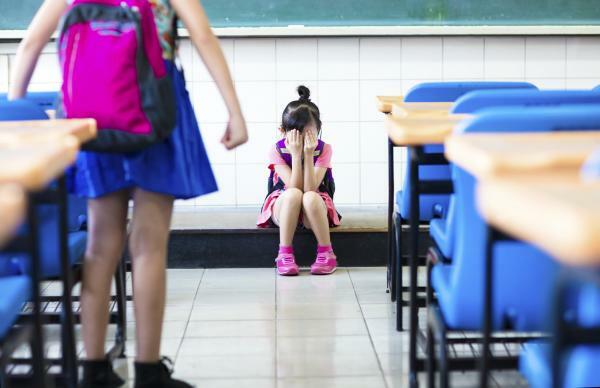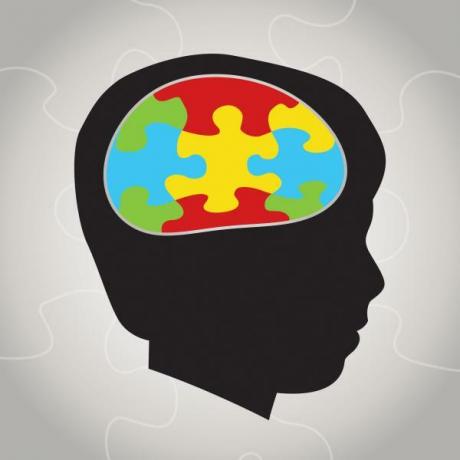
Bullying is a social problem that has always existed and that in recent years seems to have increased even more. Luckily, there is also more awareness in society about bullying in schools and institutes every day. Psychologists are the professionals who help deal with the problems that surround this bullying and with it, but There are cases in which the intervention of psychiatrists may be necessary and it may even be that of the authorities. Obviously, the action of the family and those closest to the victim of bullying is also essential to end the problem.
In this PsychologyOnline article we present a case study of bullying or bullying, with the corresponding analysis and procedure from the psychological point of view.
Index
- General Principles of the Code of Ethics and Ethical Principles
- Stage 1. Identification of the problem of bullying or bullying
- Stage 2. Alternative hypotheses regarding the problem
- Stage 3. Assess the information and options available
- Stage 4. Choose and execute the best solution
- Stage 5. Review the results
General Principles of the Code of Ethics and Ethical Principles.
The case presented is located in the Educational Context. We are facing a case of school bullying, in an Institute in Barcelona. The case is handled by a psychologist, who has been on the staff of the center for a few years. The lawsuit comes from a high school student.
Before starting to analyze the conflict and try to reach a solution to it, we must mention the General Principles of the Code of Ethics which are applicable to the case, as they refer to the protection of human rights and the obligation to report and intervene in situations of abuse, and which would be:
- Article 5, for which the purpose of the exercise of Psychology is human and social, seeking well-being, health, quality of life, fullness of development of people and groups in the different aspects of their lives, both individually and Social. On occasions when the case requires it, the psychologist must resort to the help of other professionals, without prejudice to the competence and knowledge of each one.
- Article 6, for which the psychologist is due “to respect for the person, protection of human rights, sense of responsibility, honesty, sincerity with their patients, prudence in the application of instruments and techniques, professional competence, solidity of the objective and scientific foundation of their interventions ”.
- Article 8, The psychologist must inform the COP of situations of mistreatment, human rights violations or prison conditions cruel, inhuman or degrading performed by their patients, in order to establish the best plan of action to resolve the situation.
- Article 9, the moral and religious criteria will be respected, although this does not prevent questioning in the course of the intervention if necessary for the case.
Taking as reference the EFPA metacode, its Ethical Principles (Section 2) of:
- Respect for the rights and dignity of people, by which the rights, dignity and values of people must be respected and promoted. Privacy, confidentiality, self-determination and autonomy.
- Competence, the psychologist will maintain high levels of competence, although recognizing his limits and his specialization, intervening only if he is duly qualified by his training or experience. This principle may be of special consideration in this case, since we do not know if the psychologist is a specialist in the field of child abuse.
- Responsibility, psychologists must be responsible for their actions, avoiding causing harm and ensuring that their services are not misused.
- Integrity, the psychologist must be honest, fair and respectful with people, clearly identifying their role and acting on it.
It is clear that, before starting any type of action, it is necessary to carry out a thorough analysis of the conflict. For this, the basic analysis model to be used will be the one developed by Knapp and VandeCreek (2006),Five-stage solution model.

Stage 1. Identification of the problem of bullying or bullying.
First of all, it is about identifying the problem, gathering enough information, from all possible sources, about the causes that have caused the conflict. It will be necessary to hold interviews with the people who may be involved (the protagonist, the family, people from the social environment, educators, etc ...).
In our case, the first hypothesis about the case is that we are before the School harassment (Bullying) to a student of the institute. This hypothesis has been formulated based on the information provided by the student: she requests help from the center's psychologist, since she has since entered in the center, she has been suffering practical jokes, they harass her by calling her at home, they insult her, laugh at her, etc... She has not entrusted the problem to her fathers; she is afraid that the situation could get worse. She feels humiliated by these performances.
The student asks the psychologist not to inform anyone that she has come to him for possible reprisals.
The psychologist consults with the student's tutor and she informs him that she has not noticed anything special, except that the economic performance is not very good.
The psychologist receives a note, the day after the demand, urging him not to intervene.
Starting from the most generic, Respect for human dignity, we find several Principles of Psychoethics: Charity, for which the performance of the psychologist should seek the good for the people with whom he has responsibility. The one of Non-maleficence, for which the psychologist must avoid, at all times, causing harm to his patients with his actions. This is a minimum, essential and basic duty, which must be present in any case that is presented to a psychologist. When a person requests the services of a psychologist it is evident that he hopes not to be harmed by the professional's actions. This should help him to solve his problems or difficulties, which is what is expected of him and is the main reason why patients come to consultation.
And that of Justice, since the intention must be to ensure that the patient has access to an improvement in her health.
Between the Rules Psychoethics, in this case that of the Confidentiality It is difficult to apply, since the consequences seem to be bad for the student in either case, whether he maintains the confidentiality of the information he has received or not she keeps.
Therefore, the first dilemmas arise, in the case of a minor, what is the duty of a professional before the knowledge of a possible action that is harming the person, in this case a minor, who comes to consultation? How far should the principle to which the psychologist is also obliged in his practice go: confidentiality, in the case of a minor?
This nuance regarding his minority, leads us to another of the fundamental principles of Psychoethics, the Principle of Autonomy, according to which the person has the right to govern, direct and choose, opting for the values they consider most valid. It is a principle based on the capacity for self-determination; The conflict arises, in this case, due to the limitations that being a minor may imply for the autonomy of the patient.
To resolve the age issue, it is necessary to refer to Article 25, Section III, "OF THE INTERVENTION", of the Code of Ethics that resolves it by establishing that any intervention, in the case of minors, will be carried out know their parents, avoiding, however, the manipulation of people and tending to the achievement of their development and autonomy.
Therefore, the psychologist, as a first action, he is obliged to bring the case to the attention of his parents or legal guardians, if applicable.
With regard to this information, the Articles 39, 40 and 41, Section V, "OF THE OBTAINING AND USE OF THE INFORMATION", of the Code of Ethics, which stipulate:
- Article 39, the psychologist must respect the right of privacy of his client, revealing only necessary information and always with his authorization.
- Article 40, the information collected is subject to professional secrecy, and will only be exempted from it by the express consent of the patient. The psychologist will also ensure that potential collaborators in the case also abide by this professional secret.
- Article 41When the claim is made by the subject himself, it can only be communicated to third parties with the prior authorization of the interested party and within the limits of the authorization.
Respect for these articles could seem to conflict with Article 25, which urges the professional to inform the parents of the information due to the fact that we are dealing with a minor age; However, the articles would apply, since they refer to the treatment that we will make of the information received.

Stage 2. Alternative hypotheses regarding the problem.
With the information we have, we have identified a bullying problem and, at this time, it could start the second stage of the model, referring to the need to consider different alternatives to the trouble. It is necessary to explore other possibilities, other ways of perceiving the problem, for example, asking for help to specialized colleagues, in this case, professionals specialized in childcare and abuse childish.
But and although it is always recommended, as expressed in the COPC Guide (Point 2.2.), Listen, attend and give credibility to this type of manifestations made by children and adolescents, in principle, we only have the information provided by the student. There have been no interviews with their family or social circle (friends, colleagues). The only interview that the psychologist has done other than the one with the lawsuit has been a consultation with the student's tutor, and there has been no other indication to confirm the case.
Therefore, and considering this, an alternative hypothesis that we could formulate would be that There is no case of bullying, and it may be a wake-up call from the student, so that the problem identified would no longer be a case of mistreatment, but rather a very different one.
According to the tutor, the only circumstance she could mention was that her grades were not very good; The note that appears the next day in the psychologist's office does not have to have been made by someone else, but by the student herself.
If this were the case, we should assess what has led the minor to express this demand, since possibly it is the symptom of the existence of a discomfort, for which it will also be required intervention.
At this stage, whether there is a case of abuse or it does not exist and it was an invention of the student, if the psychologist were not specialized in the subject, it would be the most appropriate time to request specialized help from other colleagues, as shown in the Article 17 -for which the psychologist must be sufficiently prepared and specialized, having to recognize the limits of her competence-, If this were the case, the Articles 16, whereby the psychologist would maintain his position of independence and autonomy, even if other professionals enter; 20º -ensuring the corresponding connections with other disciplinary areas- and the 23rd - reciprocal respect between the psychologist and the professionals consulted.
Stage 3. Assess the information and options available.
A) Yes, information that we possess at the moment, in my opinion, it is scarce and insufficient to confirm what is the real problem we are facing.
It would be risky for the psychologist to make a confirmation that he is facing a case of abuse only based on the interview with the student, as well as would be to affirm that he is facing the symptom of another situation of psychological discomfort of the student, which is what causes a reduction in his performance school.
At this point, the point 3.4.2 "Honesty, precision", section ii, of the EFPA Metacode, according to which, the psychologist must recognize and not rule out hypotheses, evidence or alternative explanations.
So there are three options at this time:
- Option 1: give credibility to the information provided by the student. Action: Begin an intervention aimed at stopping the abuse.
- Option 2: not giving credibility to the information provided by the student. Action: Begin a targeted therapeutic intervention, arranging new interviews with the patient, trying to find out the type of pathology of the patient.
- Option 3: not make any assessments based solely on the information available to you. Action: Expand the information, conducting a more rigorous investigation of the case, although using a procedure of maximum urgency and priority, due to the importance of a case of possible abuse.

Stage 4. Choose and execute the best solution.
In this case, the choice has been based on the quality of the information available to the center psychologist, analyzing the consequences that may arise.
My choice would be Option3 a Do not make any assessment, as I have to rely on scant information, as it seems insufficient to me. Begin the intervention by making a further investigation of the case, carrying out a clinical evaluation (at a physical and emotional level), which will allow us to know your physical state as well as the resources and strategies of coping that the minor has, interviews with the student's family environment, with her teachers, with her friends, etc... Also, in the first instance, I would assess the possibility that she did not attend the institute for a few days, to interrupt the acts against her, if they were finally confirmed, given the seriousness of the matter.
The analysis carried out to opt in my choice for option 3 has been the following:
If we choose option 1 and the abuse is not true, not only will the student be harmed with an intervention that is not appropriate to her case, but the consequences negative may affect third parties who may be involved without having performed any act punishable. The school can also be affected by not having the necessary preventive measures to avoid bullying.
If we choose option 2 and there is abuse, not only will the mistreatment not be interrupted, with the corresponding aggravation of the situation, but the student will be subjected to a intervention that will not adjust to her problem, causing confusion and disorientation and she will not be able to start a process adjusted to her situation.
As a good professional, she must attend to the ResponsibilityOf their acts -Article 6 COP, Article 10 and 3.3.1 of the EFTA, in the sense that the psychologist has the responsibility with respect not only to the quality of his intervention, but the consequences of their interventions, and cannot act without thinking about the Outcome.
It seems to me, therefore, that the most prudent and responsible thing is to choose option 3.
Obviously and, as I have expressed previously, the first action is to inform their parents of the facts, as well as inform the COP, an obligation set out in the Article 8 of the code of ethics.
Thus, at the beginning of the interviews, the student as well as the parents or legal guardians must be knowledgeable, through an accessible language to all of them, the obligation of the psychologist to communicate the case for their protection and the administrative and judicial procedure that may arise. The steps to be followed in this type of situation must be explained, as well as how the competent institutions have the necessary resources to act in this type of case.
At this point in the intervention, we have to take into account the rule of Veracityand ConsentBefore proceeding with the actions, the patient, in this case the parents, always have the right to give their consent to the intervention proposed by the psychologist.
Stage 5. Review the results.
This stage is about re-evaluating the problem solving process.
In this case, the solution has been to carry out an evaluation, with utmost urgency and priority, in greater depth to provide us with more information to determine whether there has been a case of mistreatment; I understand that it is the solution that can cause the least harm to the student, because we will make sure that the intervention treatment that is initiated will be appropriate to the case and guarantees, as I have previously stated, among others, the Principle of Beneficence.
This article is merely informative, in Psychology-Online we do not have the power to make a diagnosis or recommend a treatment. We invite you to go to a psychologist to treat your particular case.
If you want to read more articles similar to Case of bullying or bullying, we recommend that you enter our category of Socialization problems.


